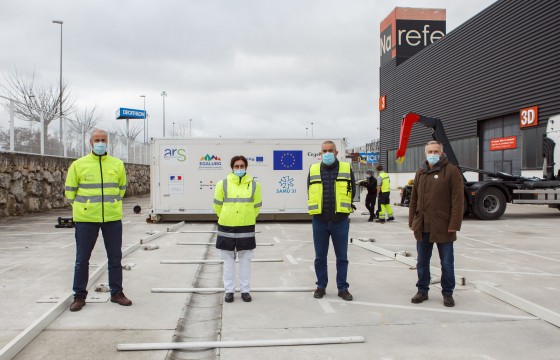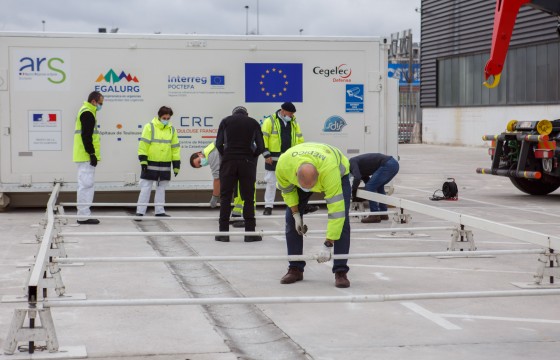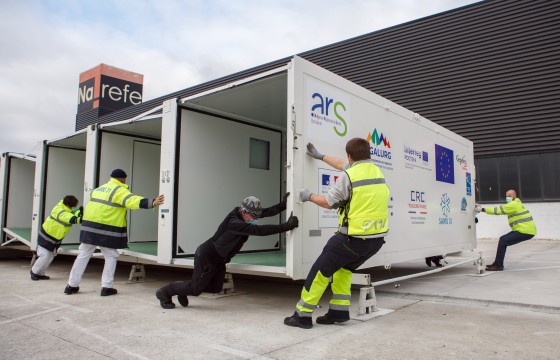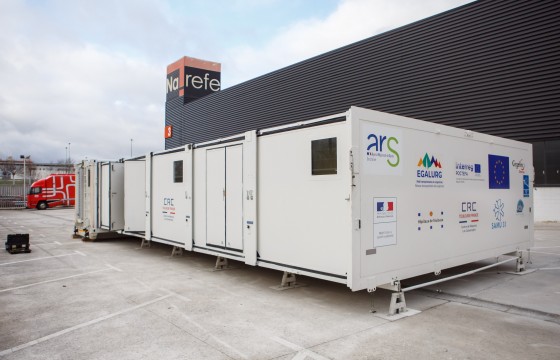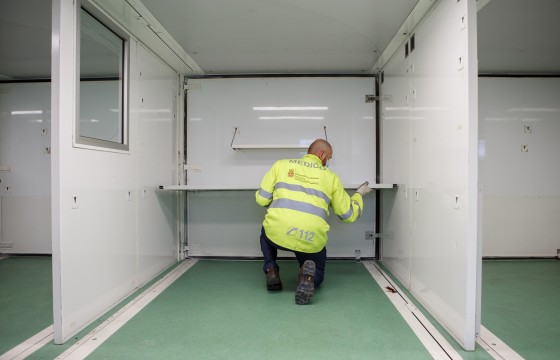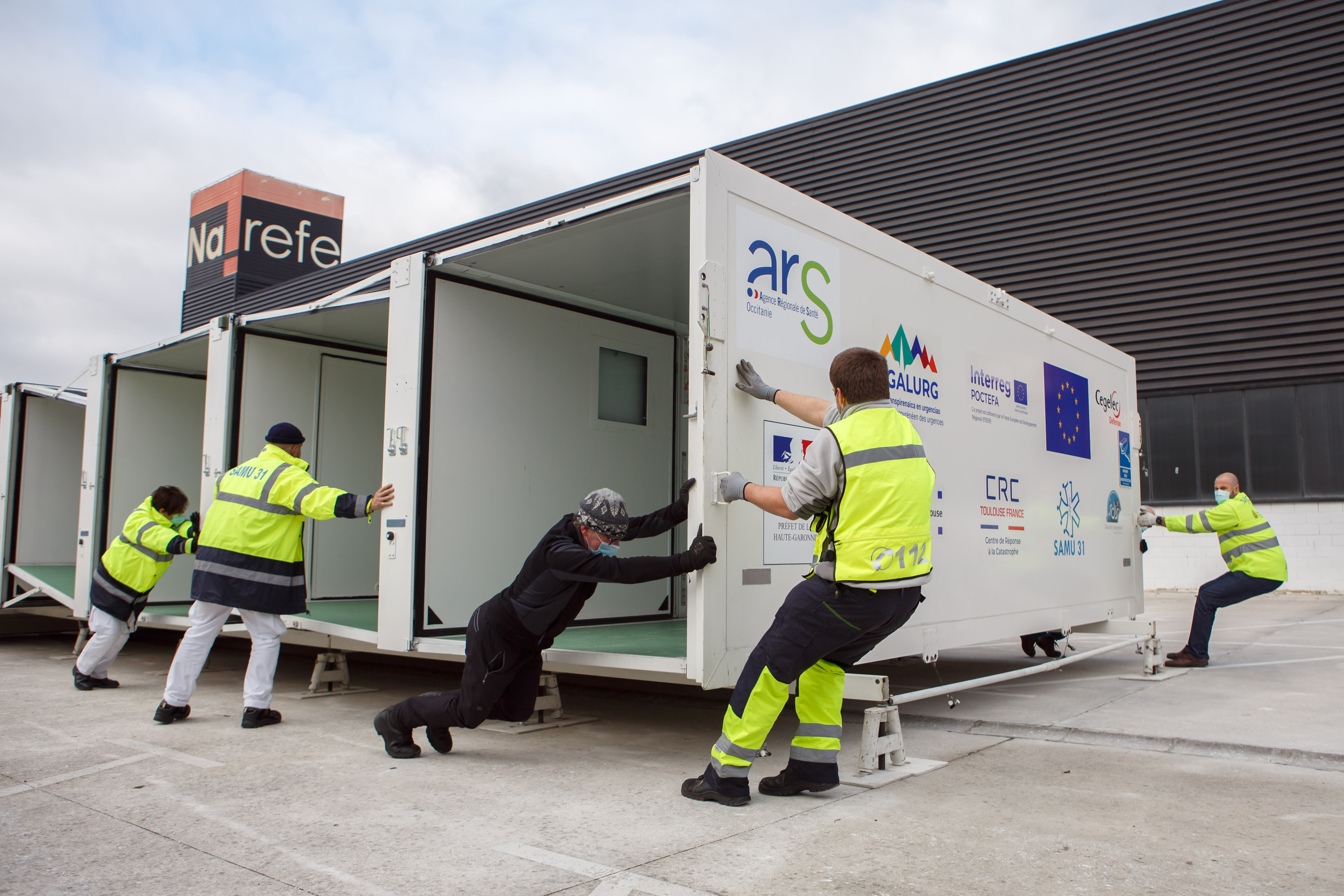
A mobile hospital providing emergency services will travel to several locations in Navarre in coming weeks to support COVID-19 vaccination procedures
- Professionals from the Emergencies Section of the Navarre Health Service, along with volunteer firefighters and workers from the University Hospital Center of Toulouse and Navarrabiomed participated today in the installation of the mobile emergency unit at the Refena Conference Center within the framework of the European EGALURG network.
The Europe Occitania Multipurpose Mobile Unit (UMPEO), built by the University Hospital Center of Toulouse (CHUT) within the framework of the EGALURG European cross-border cooperation network to improve emergency and disaster healthcare in the Pyrenees, was installed today at midday in the Refena Conference Center parking lot in Pamplona / Iruña.
As part of the strategy for vaccination, Navarre has welcomed the emergency healthcare unit with the aim of administering the COVID-19 vaccine. Primary care management professionals from the SNS-O and Navarrabiomed will coordinate the movements of the emergency unit as it travels to different towns in Navarre in January and February.
The unit will provide support for vaccination of dependent people, social health personnel, home care services and primary care professionals working in rural basic health zones. Specifically, the mobile unit will travel from Refena to different towns, including Altsasu / Alsasua-Etxarri, Irurtzun, Oronoz-Mugaire, Sangüesa / Zangoza, Carcastillo, Peralta / Azkoyen, Lodosa, Los Arcos, Estella / Lizarra. In each town, the mobile unit will act as a key vaccination center so that this procedure does not have to be given at healthcare centers, thus keeping them from becoming overcrowded. This is expected to reduce the risk of infection and speed up the vaccination process.
At the event, Diego Reyero Díez, Head of the Emergencies and Primary Care Transport Section, said that the emergency unit will provide optimal conditions for COVID-19 vaccination. He said, “The mobile emergency unit has separate areas for greater comfort and flexibility for vaccination.”
Kiko Betelu Corcuera, Assistant Director of Emergency Services and Technical Director of Vital Urgency Care in Navarre, pointed out that the mobile unit can also be used to raise awareness about vaccination and the importance of so-called herd immunity. “The increase in the vaccinated population will mark a turning point in the pandemic, so the faster that happens, the better,” said Betelu.
Innovative infrastructure in Europe
To make use of the UMPEO emergency unit, a team of professionals from the Emergencies Section of the Navarre Health Service and Navarrabiomed spent Monday and Tuesday (January 11-12) in Toulouse receiving technical training on installation deployment and handling from the CHUT, the EGALURG Project leader and also the institution responsible for building the mobile unit.
As explained by Anna Ribera Cano, an emergency services doctor from Toulouse Emergency Medical Services, another member of the EGALURG Project, “This mobile unit is unique in Europe because it can be deployed so quickly. It can be operative in 20 to 45 minutes.
As a hospital care support facility, it can handle as many as 18 patients at a time”.
The facility is designed to admit patients in intensive care beds, eight absolute emergency beds and 10 relative emergency beds, in five fully equipped subunits. It takes up a maximum area of 66 m2 and is 12 meters long. Though the mobile unit was originally designed to be used in the cross-border area at major events and mass gatherings, and to provide response services in emergencies and disasters, its construction deadlines were tightened and its design was adapted in light of the current pandemic.
Also participating in the event was Tomás Belzunegui Otano, the Scientific Director of the EGALURG Project, who said, “Though the current pandemic has made implementing the EGALURG Project more difficult, the institutions involved have continued working together on all planned actions. Being able to bring the mobile hospital to Navarre highlights the direct advantages of cross-border regional cooperation.”
The mobile unit has also been used in remote regions of Haute-Garonne to perform massive PCR testing and was deployed in Bayonne, France, to provide support for emergency services at the Hospital Center of the Basque Coast (CHCB), which was overwhelmed by the pandemic. After being installed in Navarre, plans include enabling the UMPEO to be used in coming months by the Emergency Medical Services of Catalonia (SEM) and the Aragon Health Service.
EGALURG cooperation network
The EGALURG consortium is headed by the CHUT, and its partners include Navarrabiomed, the CHCB and the SEM. The European network started operating in 2019 and will have a total duration of 30 months.
Its goals include harmonizing protocols for more effective use of healthcare resources. Developing innovative tools is one of the key parts of the project and is reflected in the mobile hospital, as well as a platform that will simulate emergency situations and help train healthcare personnel so they are prepared for these cases. Navarrabiomed is in charge of this platform.
The project is co-funded (65%) by the European Regional Development Fund (ERDF) through the Interreg Program V-A Spain-France-Andorra (POCTEFA 2014-2020). The goal of the POCTEFA program is to strengthen the economic and social integration of the Spain-France-Andorra cross-border area. Its help is focused on developing cross-border economic, social and environmental projects through joint strategies in favor of sustainable regional development.




